It’s a big deal to celebrate a 125th birthday but it’s even more impressive for a nonprofit arts organization with myriad challenges, from securing funding to engaging new audiences.
The New Haven Symphony Orchestra (NHSO) not only marks this milestone in October, it’s growing and thriving while staying true to its mission “to increase the impact and value of orchestral music for our audiences through high-quality, affordable performances and educational programming.”
“We’re the fourth oldest orchestra in America, following New York, Boston, and Chicago,” points out William Boughton, NHSO’s 10th musical director and principal conductor. “And with the recordings the orchestra has made, it’s taken our name across the world. As a resource for such an extraordinary thing of beauty, it’s something to be treasured by the residents of New Haven.”
“If you look back over our 125-year history,” says Elaine Carroll, chief executive officer, “there are just hundreds of thousands of people who have come to love music because they got to hear NHSO perform, and we take that as a very important legacy that we have to uphold.”
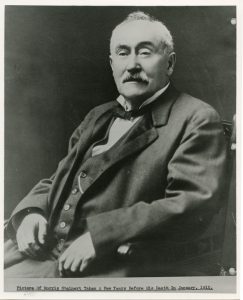
Changing with the Times
It all began in 1894 when a group of amateur New Haven musicians of German descent, who wanted to keep playing their native music in the “New Land,” convinced Morris Steinert, a German immigrant, music merchant, and instrumentalist, to form a symphony orchestra. He agreed, and the group began rehearsing upstairs above his piano store.
The orchestra performed at various local venues until 1901, when Yale University built Woolsey Hall to commemorate its bicentennial. Because of its big, beautiful auditorium and majestic pipe organ, it became NHSO’s major performance venue – and remains so today.
NHSO added children’s concerts to its repertoire in 1933 and, after World War II, Pops concerts were established and performed both at indoor and outdoor venues.
Since coming to New Haven from England 12 years ago, Boughton has witnessed the organization evolving in dramatic, positive ways.
“When I first came here, [NHSO] was close to bankruptcy and now, under Elaine and the board, it’s financially much more stable,” he says.
“Artistically, it’s changed incredibly. The musicians have been tackling repertoire they’d never done before, including a lot of contemporary music by living composers, which are fiendishly difficult. Instead of being a kind of museum piece of Western American culture, we’ve tried to become a more American orchestra of the 21st century.”
He adds, “The Pops program has been here for some time, but working with people like Chris Brubeck and commissioning new works is very recent – that combination of working with living composers and doing a much broader genre of music than just the Western European classical canon of Bach, Mozart, Beethoven, Brahms.”
Carroll thinks “it’s interesting that someone from Britain comes to the U.S. and says, ‘I want to help you identify as an American orchestra. And it’s fascinating to see that we’ve been doing so much American music since William has been here – 10 world premieres in 10 years, which for an orchestra this size is just unheard of.”
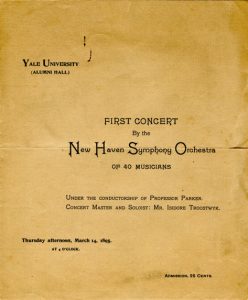
“Being Part of Something Greater”
Artemis Simerson, assistant concertmaster (violin) has been a member of NHSO for 36 years, since graduating college. She’s a recipient of the Hamden Educational Foundation’s Distinguished Alumni Award and NHSO’s Distinguished Service and Outstanding Musician awards.
Simerson has performed in many venues over the years, but what captivates her about performing in a symphony orchestra is the collaborative spirit of creating music with 65 other musicians.
“When you’re up there as a soloist, it’s very hard to get away from your ego being involved. When you’re in an orchestra, it’s like being part of something greater and contributing to a wonderful piece of art,” Simerson says. “There are always things to [deal with] on the corporate side – management, labor – like with every organization. But when you’re on stage, it’s pure. There’s no ill will. There’s no possibility of distorting the beauty of what’s up there. It’s not for this person or that person, it’s for everyone equally.”
In her role as assistant concertmaster, Simerson says it’s the same big-picture experience.
“How well do I know that music? I’m not talking about my part, at all. I mean, the whole thing, every phrase, what everyone else is doing,” she says. “You have to be on the same page as the conductor. It’s the role of supporting actor. And then it’s a beautiful dance. If someone suddenly pulls a muscle and can’t move, you have to be able to [jump in]. You really need to know the piece of music, the art, as a whole.”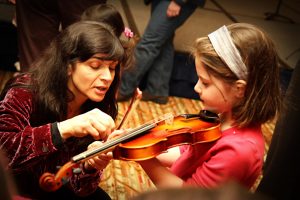
A Symphony for All
“A lot of people think this is a very exclusive, sophisticated organization,” Carroll says. “Yet when you look back to the beginning of our history, it was local German immigrants who founded this because they wanted to bring the best of their culture to New Haven, not like in Chicago and New York, where orchestras were formed by social elites. We have always been of the community and make sure our doors are thrown open to everyone.”
Boughton concurs: “Beethoven didn’t just write for the royalty. They did public concerts in those days. Woolsey Hall and other places we perform are public spaces.”
There are many ways NHSO reaches out to the community to engage a diverse audience with eclectic programming.
“One big program we started is ‘Kids Come Free,’ because we do find a lot of families struggle with the expense,” Carroll says. “So we keep the lowest-priced tickets very low and haven’t raised them in about 20 years. Movie prices keep going up, the symphony doesn’t. Everyone up to age 18 is free. So for $30, you can bring the whole family and experience something live.”
She points out that NHSO has built numerous partnerships in New Haven, including: a scholarship program with Music Haven that provides tuition-free music education for underserved New Haven youth, distributing free New Haven Reads children’s books at family concerts, giving special access to Chapel Haven residents with disabilities, hosting annual holiday concerts to benefit the Community Soup Kitchen, and more. Tickets are free for all performances to active duty military personnel and their immediate families.
Reaching out to schoolchildren also is a top priority.
“We’re very often a child’s first exposure to a symphony orchestra,” Carroll says. “We take that role very seriously. In a season, we reach about 38,000 people. Last year, 18,000 of them were children. We go all over the state; we [do programs] in 42 school districts.”
Carroll credits Education Director Caitlin Daly for her interdisciplinary work with the schools, including a songwriting program funded by The Harmony Fellows Grant. The program encourages musicians from diverse backgrounds, who are pursuing an orchestral career and are traditionally under-represented in orchestras, to apply for the two-year fellowship program.
“Caitlin really gets our community and created a hip-hop songwriting program where students are writing their own music and our musicians are recording classical loops for them,” Carroll says. “She understands we’re going to catch more kids with hip hop than Mozart but are exposing them to classical music starting from their own place of interest.”
Carroll is excited about a big project on tap for April, commemorating the 80th anniversary of Marian Anderson’s historic concert at The Lincoln Memorial in 1939, kick-starting the Civil Rights movement.
NHSO will hold a Civil Rights concert at Southern Connecticut State University and has commissioned a film, “New Morning for the World,” based on Joseph Schwantner’s classical album in tribute to Martin Luther King, Jr.
“There’s never been a visual to go with that piece, so we’ll be creating a world premiere,” she says.
Boughton will end his 12-year tenure with the orchestra in May, when Alasdair Neale will assume the title of music director.
The outgoing director fondly recalls how, when he first directed Beethoven’s 9th Symphony with NHSO at Woolsey Hall, he spoke with a man who identified himself as a professional wrestler after the concert.
“He said he’d spent his whole life going to rock concerts,” Boughton says. “He had never been to an orchestral concert before and he sat there in tears and said it was the greatest experience of his life.”
Carroll has experienced similarly moving encounters.
“We have groups of Girl Scouts come out to Pops concerts and they get their badges,” she says. “[At one concert] when we asked them, ‘What do symphonies do?’ one little girl raised her hand and said, ‘You make people happy with music.’ It’s really that simple.”
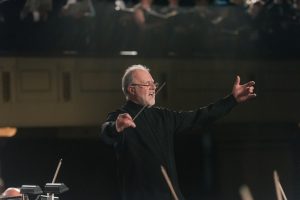
NHSO 125th Birthday Bashes
125th Opening Night Concert
October 4, 2018 at 7:30 p.m.
Woolsey Hall, 500 College St.,
New Haven – Featuring conductor William Boughton
and violinist Chad Hoopes
Tickets: $15 – $74; kids under 18 free with a paying adult; college students $10 with a student ID. Tickets are free for all performances to active duty military personnel and their immediate families.
125th Anniversary Gala
January 25, 2019
Location to be determined.
For more information, visit
www.newhavensymphony.org
or call the NHSO box office at 203-787-4282.
Photography by Nick cat


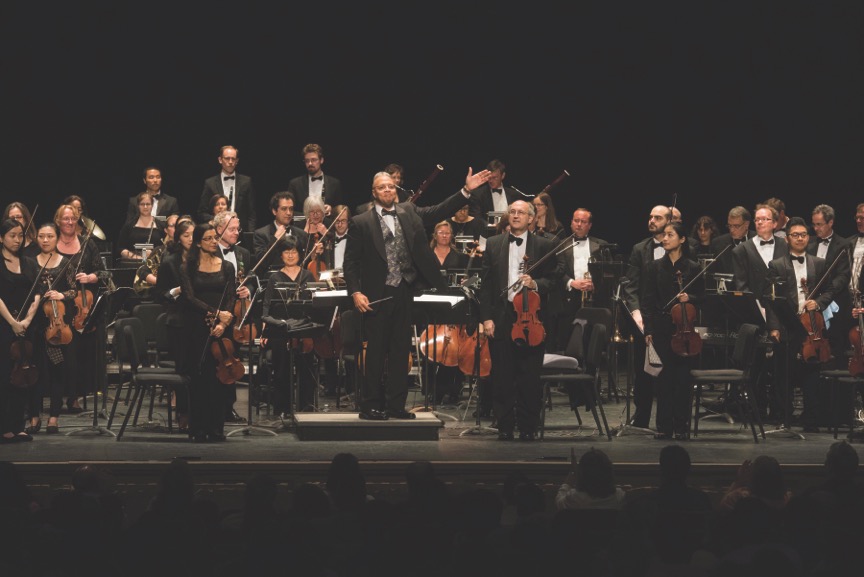



More Stories
A New, Free Peabody Museum Prepares for Opening
Arts & Entertainment – Autumn ’23
Richard Thomas: Acting Is His Life